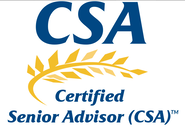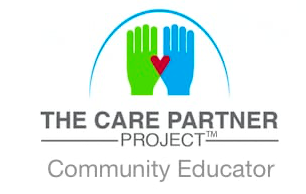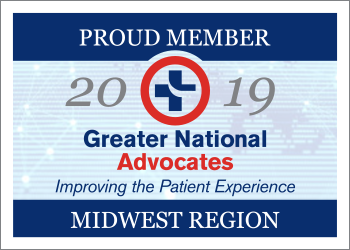 A lot of people reach out to me to talk about issues with their aging parents. It’s usually when there’s already a crisis going on. We know it’s better to plan ahead in these situations. What are some things you can do to plan ahead and be prepared for when a health crisis happens? 1. Advance directives - these include designating a health care power of attorney, filling out a living will, completing a DNR (do not resuscitate) order. If you’re a regular reader of my blog, you know I talk about these things often! Key point: don’t just list someone as your healthcare POA, ask them if they are comfortable assuming this role and talk with them about your wishes. Here’s a link to a previous blog. 2. Will, Trusts, Power of Attorney for Property - this is not my area, but it is definitely important to work with an attorney to get these set up. Leaving your family to deal with probate and the messiness of not having a will is a disaster waiting to happen! 3. Find out what assets your parent(s) have and where they are located; e.g., what bank(s), investment firms, etc. Do they have a long-term care insurance policy? This is important for planning for long-term care, if necessary. Assisted living, memory care, long-term skilled care, home caregivers are incredibly expensive. It is important to understand what assets are available for these types of care - no one wants to think they will ever need it, but many many people do. Be sure someone is listed as a beneficiary on each account and, if possible, fill out release forms so that people who control access to these assets are able to speak with designated representatives. 4. Help your parents set up portals if they have not done so. If they have set them up, ask them to share their login information. This makes accessing information and asking questions of providers/insurers so much easier! Some examples of portals you may need to access if they are unable to care for themselves include: a. Medicare (medicare.gov) - You can see your parent(s)’ Medicare number, check claims, see what Part D plan they have, send messages if there is a problem. Also, either: - Part D and Supplemental/MediGap insurance portals, or - Medicare Advantage insurance portal b. Health system portals - It is critical to have access to what medications your parent takes, their allergies, health history, test results, providers, and more. It’s difficult to be an effective advocate for someone without knowing this information. The portals (eg, MyChart) have a place to add people as emergency contacts as well as upload advance directives. If your parent sees physicians in different health systems, you can link those portals so that you can see everything in one place. c. Social Security (login.gov) - You are allowed to list an “advanced designation of representative payee” who could manage your benefits if you became incapable of doing so. You can also access your Social Security statements. 6. Communicate! Cultivate open communication… this can be challenging if it’s not the way things have worked before. I’ll talk more in my next blog about strategies for having these tough conversations. Please contact me if I can help with any of this! [email protected] Bottom line: Trust me, you’ll be glad you took the time to take care of these tasks!  Sometimes people will tell me that they feel inadequate when dealing with the health care system. I always say that no one should feel that way; rather, our health care system is designed to be confusing. When you’re not feeling well, it’s difficult to make sense of it all and remember everything you’re supposed to do. This blog is about how that can even happen to a wonderful patient advocate when she has a medical emergency! Spoiler alert: I’m okay! In December, I fainted and hit my head on the floor, was briefly unconscious, couldn’t speak at first, and my head was bleeding. Fortunately, my husband - who normally sleeps through everything! - heard the load thud and ran in right away. He said it was pretty scary. He took me to the ER. It was around 2:45am. My memory of what happened that night/morning is pretty fuzzy. I do remember thinking “I’m a patient advocate, I need to advocate for myself.” However, I had a head injury (concussion) and was in no shape to be an advocate! I recall the nurse going through my medications and supplements, and confirming my medication allergies. I later wondered if my husband would have remembered that I’m allergic to sulfa and penicillin (he didn’t remember our now 27 year-old son’s penicillin allergy when he was 12 and had to go to the ER for stitches - but that’s a story for another time!). That was a reminder to me to review that information with my family members. I had an EKG, chest x-ray, and a head and neck CT scan. I know I told my husband a couple of questions that I wanted to remember to ask the doctor. I don’t remember what the questions were or if either of us asked them. My head just felt so foggy. I recall that the doctor came in to tell me that all my tests were okay and I could leave. She was practically out of the room before she finished telling me that. I yelled to her that I had questions and she turned back to me but it was very rushed. After she left, the nurse shrugged and told me that they only have one doctor staffing the ER overnight and the ER was full. The nurse helped me walk to the bathroom and back. She then asked me if I felt okay to go home. I told her that my legs felt very weak and “weird.” She said “well, we’re completely full but if you want to stay here, we can wheel you to a back hallway and you can rest there.” Um, no! I did what I think most people would do and said I’d rather go home versus lying in a back hallway of an ER while Covid, flu, and RSV were filling up hospitals around the country. I probably should have asked her to relay that info to the doctor but, as I keep saying, it was very hard to think. I had leg weakness for a few weeks but did have two telehealth doctor visits about that in the few days following my ER visit. The nurse then told my husband to go get the car, warm it up, and that she’d bring me out. This is the point where the nurse definitely did not follow patient safety protocol! Once my husband left the room, she started going through the discharge instructions with me. I remember thinking that he should have been there to listen because my brain really was not registering everything. However, I didn’t have my cell phone with me and couldn’t call him. And, honestly, I really just wanted to go home, wash the blood out of my hair, and sleep! As patient advocates, we know that everyone needs someone with them at discharge… and I think that every nurse, doctor, hospital administrator, etc should know that too! It is so important to understand what signs and symptoms require a trip back to the ER or a call to the doctor. I really wasn’t fully comprehending all that she was telling me. Reflections on this experience: (1) I understand even more why people of any age and ability need someone with them in the hospital. I’m very educated about how the system works and about patient safety protocols BUT when you have a situation that requires an ER visit or hospital stay, it is really difficult to think clearly; certainly that applies to a head injury situation! (2) This was a reminder of the importance of regularly reviewing medications, allergies, health issues with whoever the people are who may be in the ER or hospital with you. (3) During an ER visit about 10 years ago, I recall the ER doctor telling me that the ER is about dealing with acute health issues; if they don’t find anything terrible, they send you home - even if they haven’t figured out why the issue happened or addressed all your symptoms. That’s exactly how it felt on my recent visit. Be sure to follow up with your regular doctors after your ER visit. (4) This was another reminder that our health care system can do better Obviously, that is not news to me, or probably to most of you reading this, but it was a first-hand experience of it. In this case, the most glaring example is that the nurse should have gone through the discharge instructions before sending my husband to get the car. We’ll see if the hospital system takes my feedback into account.  Holidays are often a time when we see family we may not have seen in a while. You may notice physical or cognitive declines in older family members. Be sure to take note of these changes and thoughtfully raise issues of health, safety, and living situation if it’s warranted. While we like to think of the holidays as a time to relax and catch up, they also offer an opportunity to take care of important health and financial planning. Here are some things that are important to have put in order before there is a health crisis:
Please contact me if I can help with anything.
taking place this fall, it’s imperative that we review our current plan and see what our options are for 2024.
Here are some things to keep in mind regardless of where you get your health insurance:
Medicare Medicare Open Enrollment starts October 15 and you can’t watch TV these days without seeing commercial after commercial about different Medicare insurance options. During Medicare Open Enrollment you can:
A few tips:
Health Insurance Marketplace and Employer Health Plans
Bottom line: Be sure you understand your options, get your questions answered, and know your preferences (cost, access, convenience, willingness to accept risk, etc.) before you make a decision. Contact me if I can help answer questions or conduct an analysis for you.
However, It really is a gift to yourself as well as to those you love to make your wishes known and designate someone to carry them out for you. Ask anyone who had to go through this situation without knowing the other person’s wishes and you’ll hear stories of guilt, fear, sadness, and often, irreparable harm done to family relationships.
One important document you need is a Health Care Power of Attorney - allows you to designate someone to serve as a your proxy or agent in case you are unable to make medical decisions on your own. This is the link for the form for Illinois. It’s critical to not only fill this out, but make sure the person you designate is comfortable taking on this role and talk to that person about what decisions you would want them to make, if needed. You can fill out the form without consulting a lawyer, it just needs to be witnessed, not notarized. To help you have the conversation with your health care proxy and other loved ones, this Five Wishes booklet is helpful. Five Wishes is a national document accepted by almost all states. It includes a form to list your Health Care Power of Attorney but also includes an easy-to-use way for you to let people know what kind of care you would want. Advance care planning puts you in control. Aging and being diagnosed with a serious illness generally brings so much uncertainty and fear, so anything that gives us a sense of control can be comforting. It’s the perfect time to think about your wishes and who you want to be in charge of carrying them out for you. Please, if you haven’t done this yet, put it at the top of your to do list!  Choosing the right health insurance plan can be overwhelming. It may be tempting to just keep the plan you currently have rather than look at spreadsheets and dense, hard-to-decipher descriptions of coverage options. That’s a mistake. Whether you’re over 65 and inundated with advertising about Medicare open enrollment options or getting your insurance through the Marketplace or working for a company whose annual open enrollment is taking place this fall, it’s imperative that we review our current plan and see what our options are for 2023. Here are some things to keep in mind regardless of where you get your health insurance:
Medicare Medicare Open Enrollment started October 15 and you can’t watch TV these days without seeing commercial after commercial about different Medicare insurance options. During Medicare Open Enrollment you can:
A few tips:
Health Insurance Marketplace and Employer Health Plans
Bottom line: Be sure you understand your options, get your questions answered, and know your preferences (cost, access, convenience, willingness to accept risk, etc.) before you make a decision. Contact me if I can help answer questions or conduct an analysis for you.
We know that providers should use plain language when speaking with patients, yet we also know from experience that that is often not the case. Providers may often rush through instructions as well. And not every provider’s office gives you an after-visit summary or provides a plain-language after-visit summary.
What is teach-back? According the Agency for Healthcare Research and Quality, “the teach-back method is a way of checking understanding by asking patients to state in their own words what they need to know or do about their health. It is a way to confirm that you have explained things in a manner your patients understand. The related show-me method allows staff to confirm that patients are able to follow specific instructions (e.g., how to use an inhaler).” While teach-back is actually a method that providers should be trained in and use, we also know that they usually don’t. As patients, we can initiate a “teach back” moment ourselves! After your doctor tells you something, such as your diagnosis or treatment plan, repeat it back in your own words. That way, they can determine if you understood the instructions and it gives them an opportunity to make corrections. For example, suppose you have diabetes and monitor your blood sugar level at home. The doctor explains to you what to do if your blood sugar is low or high. After they explain this to you, they should ask you to repeat it back to check for understanding. This understanding should include what range is low, what range is high, and what to do in each case. If the doctor doesn’t ask you to repeat it back, you could initiate the teach-back yourself: “Dr. Smith, I just want to be sure I understood correctly. If my blood sugar is low [give number], then I should eat or drink [give example]. If my blood sugar is high [give number], then I should [give example].” If you get this wrong, the doctor knows that they need to repeat the instructions, perhaps using different language or approach. Teach-back is not a quiz for patients; it’s actually puts the onus on providers to explain information clearly. However, since I’ve rarely seen it used in practice, I recommend that we, as patients, take this into our own hands and use it for ourselves! Bottom Line: We need to advocate for ourselves. One way to be sure that we understand information correctly is to use the teach-back method.  A few months ago, my friend’s daughter, a freshman in college, had a health scare. Fortunately, everything turned out okay! But my friend hadn’t had her daughter fill out any of the necessary forms to allow the doctor and hospital to release information to her or even to speak to her about her daughter’s medical concerns. Trying to get a busy (and uninterested) college student to fill out the necessary forms while in another state in the middle of a semester was not quick, easy, or painless. There are privacy laws (HIPAA) that restrict what a health care provider can share about any adult 18 years or older. Yes, this applies even if your adult child is still on your health insurance plan and even if you are paying the bills. Please refer to this article with advice about what forms you should have your 18+ year-olds sign. You can complete these forms on your own or meet with an estate planning attorney.
Briefly, the four important documents are:
If your adult child is attending college in another state, it may be safest to fill out forms for each state. Some colleges have their own forms as well (e.g., the University of Illinois has this authorization to release confidential health information form); this is something worth asking about at parent orientation. Note that it is never - regardless of the person’s age - enough to just write the name of the person who you want to be your health care power of attorney. It’s critical to first ask them if they are willing to take on this role, if needed, and then have an in-depth conversation about your wishes. Once you’ve filled out the forms, keep them in a secure place. Also, be sure to scan them so you can easily access them from your phone as well as from your child’s phone. Bottom Line: while you’re checking towels, sheets, comforter, etc off of your college packing/to do list this summer, please add “fill out important forms!"  I think we’re all aware that there is a mental health crisis in this country. As a result, it can be REALLY difficult to find a therapist who has availability, much less a therapist with availability who is in your health insurance network. Are you stuck paying out-of-pocket for the entire amount? Maybe not! In the past couple months, I helped a client with her network gap exception request as well as advised a friend how to request one. In both cases, these exception requests were approved. So, what does this mean and how do you get your request approved?
Suppose you have a child with anxiety who needs to be seen by a mental health provider. You request a list of in-network providers from your insurer. You call each provider who is located within a reasonable distance and are told that none of them have any availability for new patients… or perhaps they are taking new patients but only self-pay patients. Your child needs help, so you end up finding someone who will see your child and you pay 100% out-of-pocket. Now, you should be thinking: I’m going to call my insurer and request a network gap exception! Call the customer service number on the back of your health insurance card. Tell the representative that you’d like to request a network gap exception. This is the information that you’ll need before you make that call:
What happens if you are approved?
While, I am focusing on mental health providers here, you can request network gap exceptions for any type of provider. As always, any time you call a health insurance company, take notes and ask for the representative’s name and a reference number for the call. Good luck with your network gap exception request! Bottom line: It never hurts to ask! I had a great win for a client recently! Award-winning investigative journalist/author Marshall Allen decided to write a "Victory Story" about it. Read about it here. Contact me if I can help you with your insurance/billing issue!
|
AuthorWrite something about yourself. No need to be fancy, just an overview. Archives
February 2024
Categories |
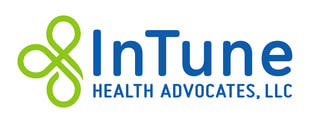
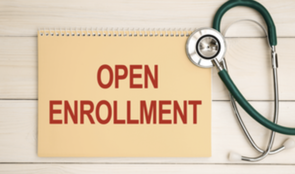

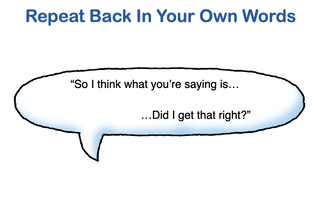
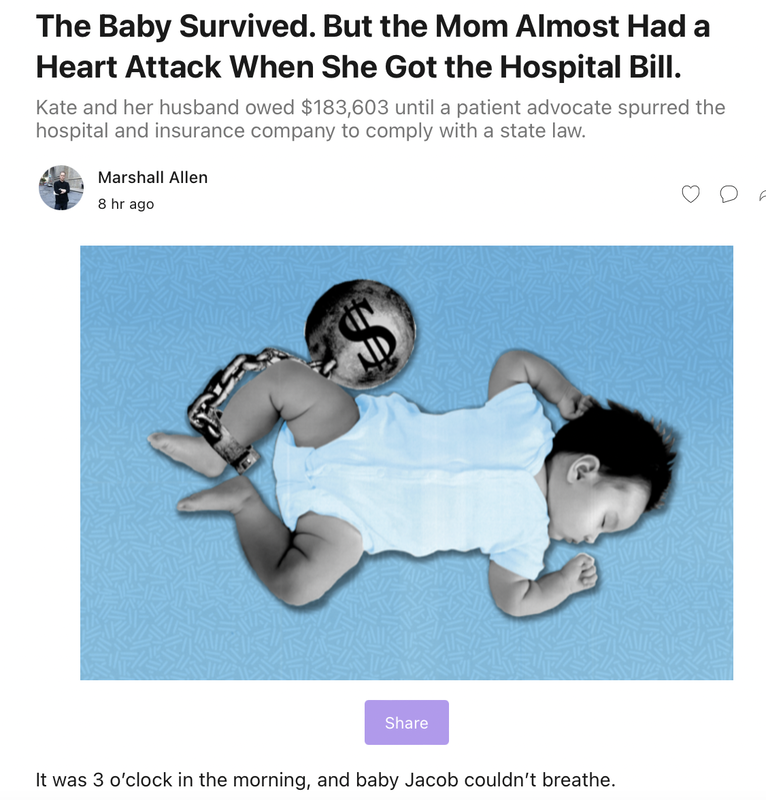
 RSS Feed
RSS Feed

